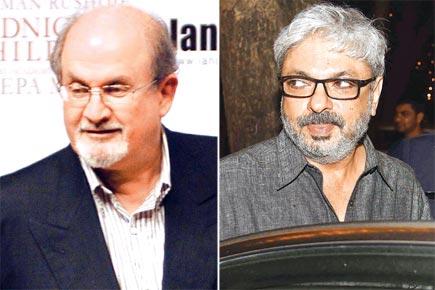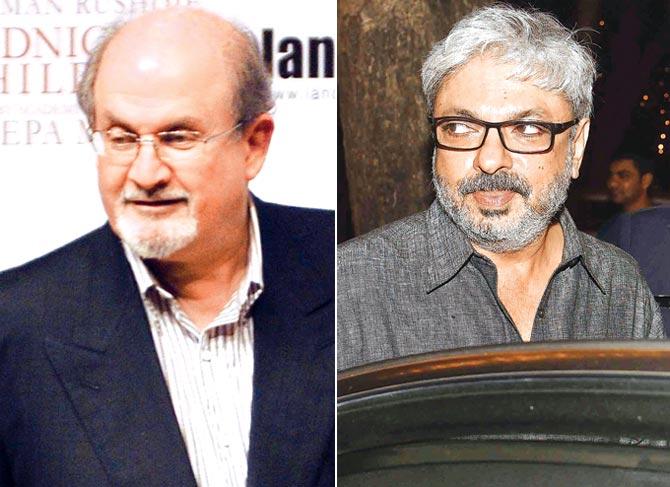When the 'soft state' becomes the silent spectator, what choice does an artiste have but to befriend and make peace with the mob?

Salman Rushdie and Sanjay Leela Bhansali

Salman Rushdie and Sanjay Leela Bhansali
 They seemed like a harmless bunch of blokes wearing sherwani and hennaed beards, casually strolling into Diggi Palace in Jaipur on a winter afternoon—as if they had stopped by on their way to the neighbourhood sabzi mandi. The Jaipur Literature Festival (JLF) was on, in 2012.
They seemed like a harmless bunch of blokes wearing sherwani and hennaed beards, casually strolling into Diggi Palace in Jaipur on a winter afternoon—as if they had stopped by on their way to the neighbourhood sabzi mandi. The Jaipur Literature Festival (JLF) was on, in 2012.
ADVERTISEMENT
These locals, as you might recall, were there to check on Salman Rushdie—nursing a grudge against the author for the novel Satanic Verses he'd written in 1988. Which of them had read Satanic Verses isn't the point. I closely followed these cherubic Chacha-jaans merely to see how they would create fuss for instant national attention.
Whether or not these polite gents had politicians backing them, or men with well-oiled muscles in convoys parked outside, one doesn't know. They basically had to do nothing. They milled around the festival venue, casually chatted with the organisers, and left, knowing in advance that they were already the victors.
The muscular state machinery that prides itself on upholding law—invested with a monopoly over violence for the same reason—had coolly cowered before these old men already. Rushdie was told to stay away from JLF. Government couldn't guarantee his security. It went after authors who had read passages from Satanic Verses instead. A video-conference with Rushdie also had to be cancelled.
Civilised debate quelled. The unlettered had won. State sat as silent spectator. As in the past, that gleam on those Chacha-jaans' faces continue to inspire similar self-styled groups to hurt anybody's freedom of speech and expression as they like, because they can get away with it in India, with threat and even violence—since they hold unique copyright to Gods and communities.
Therefore their own sentiments get hurt very easily. What exactly is the medical ramification of a 'hurt sentiment'? Nobody knows. But only the hurt sentiments of aggressive extremists, competing between all religions and communities, appear to matter.
Why do I bring up the 'Rushdie Affair' (1988) still? It was possibly the beginning of the end. Briefly, Rushdie was charged with blasphemy over Satanic Verses, by people who had most likely not read his rather dense book, let alone understood it to offer a strong critique.
Bookshops in the UK and the US were bombed, Japanese translator murdered, Norwegian publisher shot at, and a self-proclaimed fatwa issued by the Ayatollah of Iran. This was about a decade since the gradual takeover of power by religious extremists in faith-based Muslim countries had begun, with much gusto.
Britain, Rushdie's adopted nation, offered him security to the level of a head of state to protect his constitutional freedom. If anything, Rushdie sounded like a bit of an ingrate in his memoir Joseph Anton, while recounting his debt to the Brits.
'Secular' India, the country of Rushdie's origin, was the first in the world to ban the import of Satanic Verses. This entrapment has been given a political term, 'appeasement'. It just means a politically opportunist state.
Besides terrorism in the name of Islam in Kashmir, the late '80s also coincides with the rise of Hindu chauvinism, in North India, in particular—opening up several, similar threats and attacks on helpless artistes, authors, filmmakers, academicians, by self-appointed custodians of morality and 'Hindu'/'Indian' culture, who were deemed only until recently as the 'loony fringe'. Currently they seem to occupy the mainstream.
What choice does one have but to make peace with the mob, since the gooey, soft state has already set frightening precedent of siding against freedom of speech in the past anyway? Why should one set of fanatics—from the majority, minority or imagined community—not enjoy the same right to intimidate as the other then? Ever since Rushdie, this self-destructive binary has dictated most (online) conversations on attacks by Hindu groups: "But hey, what about Satanic Verses?"
It's the same whataboutery, citing of the past, and 'where-were-you-giri' that applies to even more heinous community-based crimes and injustice, as if two wrongs make a right. The only time two (W)rights ever made anything, it was the aeroplane, and humans have soared since.
So yeah, over half of India wasn't even born during the 'Rushdie Affair' (as true for the disturbing exodus of Kashmiri Pandits in '90, for instance). But we know what everyone was saying and doing on social media while artistes and fellow citizens were being attacked by groups in the name of religion or community post 2010. No, we won't use it against you if your own house is set on fire—if not here, maybe in another country.
Some of Bollywood did bat for director Sanjay Leela Bhansali while he was roughed up, and his set vandalised for filming the legend (not even recorded history) of Queen Padmavati and King Allauddin Khilji. The only absurdity that emerged were some claiming that the group of miscreants hadn't even read Bhansali's script—so they must calm down, and beat up the director later, maybe?
Speaking at a panel discussion I once attended on the Satanic Verses ban, a female Islamic historian reasoned that there was nothing in Koran that could allow for the killing of Rushdie. To which, Javed Akhtar jumped up, said, "So if there was! It would be okay?"
Mayank Shekhar attempts to make sense of mass culture. He tweets @mayankw14 Send your feedback to mailbag@mid-day.com
 Subscribe today by clicking the link and stay updated with the latest news!" Click here!
Subscribe today by clicking the link and stay updated with the latest news!" Click here!







